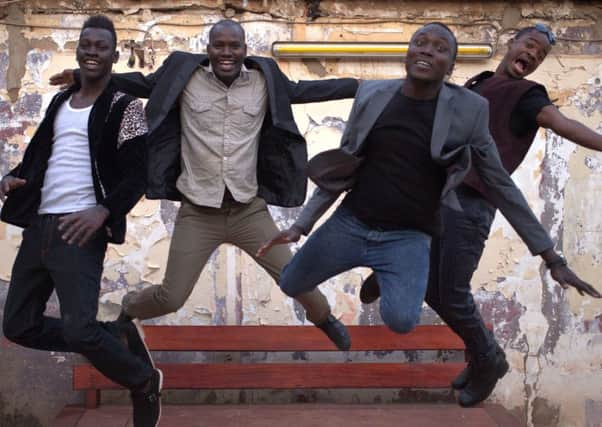World music preview: Songhoy Blues


During the 15th and 16th centuries, the Songhoy empire dominated Africa’s Niger Valley, from Senegal in the west to present day Niger in the east. By the late 16th century, however, it was in terminal decline. But if the Songhoy people are regarded these days as a marginalised minority, the “desert blues” band which bears their name is also displaced, the exuberance of its performances masking the grim realities which forced its musicians to flee their home city of Gao, when it came under the control of Islamic extremists who effectively banned the playing of music.
Songhoy Blues, who play Glasgow’s SWG3 venue next Thursday, emerged from the ancient city of Gao, once capital of the Songhoy empire, where guitarist Oumar Touré and singer Aliou Touré (no relation, Touré is a common name in Mali) were hooked on R&B, hip-hop and such classic rock as Jimi Hendrix. By the time they were students, they’d met up with guitarist Garba Touré, though they still weren’t playing collectively.
Advertisement
Hide AdThese were increasingly turbulent times in northern Mali, with insurgent factions including the National Movement for the Liberation of Azawad (MNLA) fighting the Malian government. In March 2012, President Amadou Toumani Touré was ousted in a coup d’état, then Islamist groups who had allied themselves with the MNLA began imposing draconian Sharia law. Among other things, they banned the playing of music. Those caught doing so could be whipped, jailed or even have offending fingers lopped off.
It was hardly a place for aspiring young musicians, and Aliou, Oumar and Garba headed south-west to the Malian capital of Bamako. “We’d known each other as students and knew that each of us was playing music, but we were not playing together at that time,” Oumar, the group’s bass guitarist, recalls, during a telephone interview with the band via an interpreter. “Then, when we got to Bamako, Aliou was asked to provide entertainment for a wedding and he called up Garba to set up a band. We did the wedding and because people liked it so much we decided to continue, playing in bars and clubs. We needed a drummer so we got in touch with Nathaniel [‘Nat’ Dembele].”
They called the new band Songhoy Blues, in recognition of their culture, which had become displaced, rather like themselves. They fused traditional styles with the kind of electric Malian blues pioneered by the likes of Baba Salah and especially by the late Ali Farka Touré (in whose band Garba’s father performed as a percussionist).
They were playing in a Bamako club when French music manager Marc-Antoine Moreau recruited them for Damon Albarn’s Africa Express collaboration, and their song Soubour, which they recorded with Nick Zinner of New York indie band the Yeah Yeah Yeahs, became the opening track on the project’s album, Maison des Jeunes.
After first playing in London for the launch of that album, the Malians returned in the summer of last year to play further UK shows, including WOMAD, where they signed a contract with Transgressive Records and started work on a feature film about the banning of music in northern Mali, They Will Have to Kill Us First: Malian Music in Exile. Their debut album, Music in Exile, co-produced by Zinner and Moreau, came out on Trangressive earlier this year, to considerable critical acclaim.
Listening to their music, one can hear the loping, laid-back rhythms one associates with the kora, the west African harp-lute, but played by an uncompromisingly electric guitar band. “We’ve modernised it with electric guitar, but it keeps the same rhythms,” agrees lead guitarist Garba.
Advertisement
Hide AdThey can sing about their country’s plight with poignancy, but they also really know how to boogie. An exuberant performance during this summer’s Edinburgh Jazz and Blues Festival saw Garba’s guitar howling over that insistent west African groove with a bluesy energy that brought to mind the likes of Canned Heat, as singer Aliou jittered and gyrated manically. Ask Garba about influences and, naturally, he name-checks Ali Farka Touré and other Malian players, “but I also listened a lot to BB King and John Lee Hooker and Jimi Hendrix.
“The way I play now is maybe a mix of that. I’m trying to do it my own way.”
Advertisement
Hide AdIt was hard to equate their effervescent Edinburgh performance with the less than happy situation back in northern Mali where, despite the jihadists having been largely driven out from the north by French forces in 2013, there is still unrest. The group remains based in Bamako in the south.
“It’s true that when we are on tour and are reminded of the problems in the north – a village being attacked or people being killed, it’s tough for us to think about it,” says Oumar. “But that’s not a reason to give up on what we are doing. We want to spread the message about what’s happening in Mali and about our own culture, but there’s no need to play sad songs all the time.”
Next month, Transgressive will release a de-luxe edition of Music In Exile, featuring three new tracks which will also be available as a separate EP. Titled Re-Covered, it will offer Songhoy Blues’s intriguing take on Led Zeppelin’s Kashmir, Manu Dibango’s Soul Makossa and, perhaps most appositely, the Clash’s Should I Stay or Should I Go – the all too real dilemma faced by all refugees.
• Songhoy Blues play SWG3, Glasgow, on 22 October, www.songhoyblues.com/www.transgressiverecords.com